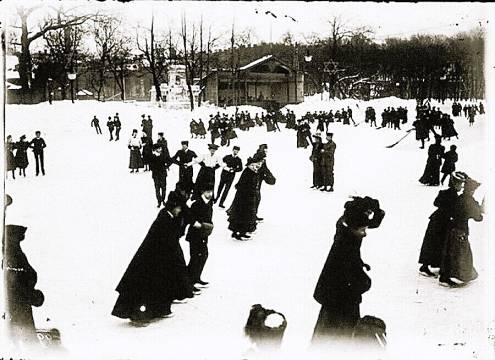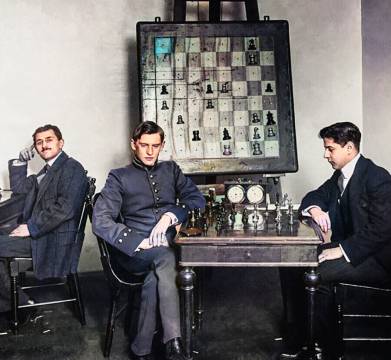

1914 before the War: Tauride Garden skating rink. Russia/Cuba chess match
Sources: webpage and Lunapic
1. TO CAMILLE HUYSMANS.1
The Russian Social-Democratic Labour Party was formed in 1898 as an illegal Party, and has always remained such. Today too our Party can exist only as an illegal Party since even the party of the moderate liberals has not been legalized in Russia.
The liberals published an illegal organ abroad up until the 1905 Revolution in Russia.2 When the revolution was defeated, the liberals turned their backs on it and indignantly rejected the idea of an illegal press.
And so too surfaced in the opportunist wing of our Party the idea of renouncing the illegal Party, of liquidating it (whence the "liquidators" tag) and replacing it with a legal ("open") party. On this point the differences are absolutely irreconcilable. It is impossible to restore and build up an illegal Party with people who reject it.
Our entire Party condemned liquidation formally and unqualifiedly in 1908 and for the second time in 1910.
The Conference of August 1912 3 and the Organizing Committee it elected recognize the illegal Party in word but not in deed, for in the aftermath of the August Conference the newspaper of the liquidators in Russia (Luch and Novaya Rabochaya Gazeta)4,5 continued from its legal vantage point to attack the very existence of the illegal Party (numerous articles by L. S., F. D., Zasulich, and others).
[...]
There can be no unity between our illegal Party, which secretly organizes revolutionary strikes and demonstrations,6 and the group of publicists who in the legal press pin the tag "strike craze" on the strike movement. (The underline is mine, EFC).
[...]
Our Party has always stood for a united international organization. Before the split of 1908 7 the Party repeated its demand for the fusion of all Social-Democratic chapters.
We disagree with the Bund (the partisan Jewish workers' organization that supports the Organizing Committee) because it flatly refuses to proclaim the principle of non-partisan chapters, overlooks the Party resolutions apropos and spurns amalgamation.
It must be emphasized that the Bund refuses to amalgamate not only with organizations subordinated to our Central Committee but also with the Lettish Social-Democratic Party, the Polish Social-Democratic Party and the Polish Socialist Party (the Left wing). Consequently, when the Bund poses as an amalgamator, we reject its claim and declare instead that it splits the movement since it refuses to blend in with the Social-Democratic chapters.
[...]
Lastly we reprove the Organizing Committee and the many fictitious groups and organizations abroad for declining to admit openly, loyally, unequivocally, that our Party enjoys the support of the overwhelming majority of class-conscious workers in Russia.
[...]
2 Lenin is referring to Osvobozhdeniye (Emancipation) the fortnightly journal of the bourgeois liberals, published abroad from 1902 to 1905 and edited by P. B. Struve. In January 1904 it became the organ of the liberal-monarchist Osvobozhdeniye League. This league formed the core of the Cadet Party.
3 The Conference of August 1912 was held in Vienna. It was attended by representatives of the Bund, the Caucasian Regional Committee, the Social-Democrats of the Lettish Region and the editorial boards of Golos Sotsial-Demokrata, Trotsky's Pravda and the Vperyod group. The St. Petersburg and Moscow sponsors of the liquidators and the editorial boards of Nasha Zarya and Nevsky Golos also sent delegates. The Conference adopted anti-Party resolutions on all questions of tactics and reproved the existence of an illegal Party. The delegates were unable to pick a Central Committee, so they charged Trotsky with creating an Organizing Committee instead.
4 Luch (Ray) was a legal daily of the Menshevik liquidators, published in St. Petersburg from September 29, 1912 to July 18, 1913. It ran 237 issues. The newspaper was financed chiefly by contributions from the liberals. Ideological leadership was in the hands of P. B. Axelrod, F. I. Dan, L. Martov, and A. S. Martynov. The"open party" liquidators used the columns of this newspaper to oppose the revolutionary tactics of the Bolsheviks, advocate the opportunist "open party" slogan, deplore revolutionary mass strikes and criticize the most important points of the Party Programme. Lenin called the paper a mouthpiece of the renegades.
5 Novaya Rabochaya Gazeta (New Workers' Paper) was a legal daily of the Menshevik liquidators, published in St. Petersburg from August 1813.
6 Chapter 15, Item 3.
7 The split was formalized at the Fifth All-Russian Party Conference held in Paris from January 3-9, 1909, in the Gregorian calendar ("New Style"). Lenin and the Bolsheviks waged a fight on two fronts: against the Menshevik Liquidators and against the Otzovists. On Lenin's motion, the conference emphatically condemned the liquidation stance of the Mensheviks and Otzovists and laid down the tactical line of the Bolsheviks during the period of reaction. The holding of the conference corresponded to the dates December 21-27, 1908, in the Julian calendar ("Old Style").
2. POLITICAL DISPUTES AMONG THE LIBERALS.
Those who judge politicians and political parties by their words are foolish.
3. NATIONAL EQUALITY.
Amidst the alarms and turmoil of the struggle for existence—for a bare livelihood—the Russian workers cannot and must not forget the yoke of national oppression under which the tens and tens of millions of "subject peoples" inhabiting Russia are groaning. The ruling nation—the Great Russians—constitutes about 45% of the Empire's population. Out of every 100 inhabitants, over 50 belong to "subject peoples".
And the living conditions of this vast population are even harsher than those of the Russians.
The Black Hundreds aim to foment antagonism among the different nations, to poison the minds of the ignorant and downtrodden masses. Oppressing nationalities is the policy of dividing nations and of systematically corrupting the people's minds. Pick up any Black-Hundred newspaper and you will find that the persecution of non-Russians, the sowing of mutual distrust between the Russian peasant/petty-bourgeois/artisan and the Jewish or Finnish or Polish or Georgian or Ukrainian peasant/petty-bourgeois/artisan is the be-all and end-all of the whole Black-Hundred gang.
[...]
The Black Hundreds carry on a particularly venomous hate-campaign against the Jews. The Purishkeviches try to turn the Jewish people into the scapegoat for their own sins.
And that is why the R.S.D.L. group in the Duma did right in putting Jewish disabilities on the header of its Bill.1
Schools, the press, the parliamentary rostrum—everything is being used to sow ignorant savage and vicious hatred of Jews. This dirty and despicable work is undertaken not only by the Black Hundred scum but also by reactionary professors, scholars, journalists and members of the Duma. Millions and thousands of millions of rubles are spent on poisoning the people's minds.
It is a point of honour for Russian workers to endorse this Bill against national oppression with tens of thousands of proletarian signatures and declarations. This will be the best means of consolidating complete unity, of amalgamating all the workers of Russia irrespective of nationality.
4. CRITICAL MOMENT.


St. Petersburg: The thermometer registers -16ºC. Many people have perished from the cold.
Paris: Since the Czar's Manifesto of October 1905 more than forty thousand individuals have been arraigned and sentenced for holding illegal opinions; more than three thousand were executed.
St. Petersburg: There are 110,604 workers on strike. A hundred and thirty-four particularly rowdy ones were arrested.
The President of the Russian Council of Ministers has resigned.
Paris: Serbia is preparing for war.
German and Russian newspapers are exchanging such abusive phrases that one may surmise a military conflict between these powers looms near.
[...]
Germany sees its military hegemony imperiled and mistrusts Russia because Russia has rebuilt her Army to an alarming degree and beefed up her Navy. The Russian Prime Minister has after all these preparations stated publicly that Russia need not fear any neighbour for she can not only defend herself but go on the offensive and wage war beyond her borders. We are therefore at a moment of genuine peril for the peace of Europe.
St. Petersburg: A demonstration called to protest the government's ban on workingman newspapers has rallied more than thirty thousand workers.
St. Petersburg: Sixteen thousand workers have gone on strike at the Putilov armaments factory.
St. Petersburg: Three hundred and twenty-six cases of poisoning occurred inside factories whose workers refused to join the general strike. Police exposed the group responsible for the poisoning.
St. Petersburg: A factory owners' lock-out left eighty thousand workers unemployed. The lock-out is expected to last eight days.
St. Petersburg: Most workers have returned to work. However thirty thousand metal workers called a strike.
St. Petersburg: Police have arrested many students and workers who proclaimed a revolution for yesterday April 17.1
St. Petersburg: Most workers have gone back to work, but thirty thousand metal workers called a strike.
Russian Minister Sazonov declared in the Duma that Russia's foreign policy is guided by her unbreakable alliance with France and by a friendly attitude toward England.1
Moscow: A blaze at a celluloid factory killed fifty workers.
Near "Tachudnov" (?) Railway Station: Terrorists attempting to blow up the Imperial Train blew up the mail instead. There were many casualties in the coaches' section.
St. Petersburg: The number of striking workers climbs to a hundred and sixty thousand. Strikers overturned several trams this morning. The police did not intervene. Cossacks strive to maintain law and order.
Riga: A hundred and thirty thousand workers are on strike.
St. Petersburg: Strikers downed telegraph poles and seized carts to build barricades with, and from those barricades open fire on troops. Ten strikers died in a gunfight today, many more were wounded. Three policemen are seriously hurt. The troops managed to overrun the barricades and burn them down. The strikers attempt to rupture water pipes, blow up bridges and dismantle railway tracks.
St. Petersburg: Extraordinary pro-war sentiment in Russia. The strikers decided to return to work or enrolled in the Army. The entire press approves Russia's intervention on behalf of Serbia.
Paris: Several demonstrations passed by the Austro-Hungarian Embassy clamouring for war. It is believed that Austria stands ready to exploit the assassination of Archduke Franz Ferdinand of Austria (June 28, Sarajevo) to trigger a war. Germany has adopted a conciliatory tone. A strong Austrian fleet is poised to attack the port of Antivari (Montenegro). German Emperor Wilhelm II has returned to Berlin precipitously. The Czar has appointed Grand Duke Nicholas Generalissimo of the Russian Army.
Vienna: The Austrian government has delivered its official declaration of war to Serbia.
| And Now For Something Completely Different |